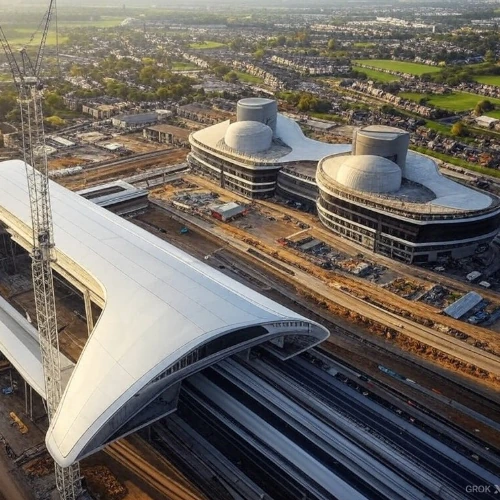Infrastructure Projects
The construction of new nuclear power plants in the UK, notably Sizewell C, has been marked by substantial delays and cost overruns. Sizewell C, projected to cost £40 billion, aims to generate 3.2 GW with two reactors. It shares its design with Hinkley Point C, which has also encountered delays and budget increases, with costs rising from £18 billion to £46 billion. EDF, the French company overseeing these projects, faces financing challenges due to additional demands from UK regulators and the impacts of the COVID-19 pandemic. The UK government is exploring alternative financing models and considering small modular reactors (SMRs) to address these issues. Despite the challenges, nuclear power remains a crucial component of the UK's strategy to achieve energy security and meet carbon reduction goals.
In the realm of transportation, the UK is set to open its first new mainline terminus train station in over 130 years as part of the HS2 rail network. Birmingham's Curzon Street Station, inspired by Victorian designs, will feature seven platforms, extensive public spaces, cycling and walking paths, and various gardens and promenades. Construction began in January 2024, with testing expected from 2026 to 2028, and aims to open by the mid-2030s. The station is designed to significantly reduce travel times between London and Birmingham to around 49 minutes. Additionally, the £2 billion Old Oak Common Station, also part of HS2, is scheduled to open by 2029, promising to be the UK's most "connected station" with 14 platforms and high-speed trains traveling up to 220 mph. HS2 aims to link London with major cities in the Midlands and Northern England, marking Europe's largest infrastructure project to date.
Housing Developments
Housebuilders in the UK are optimistic about future growth due to planning reforms initiated by the Labour government. The reforms, which include changes to England's national planning policy and expansion into greenbelt areas, aim to meet Labour's target of building 1.5 million new homes by 2029. Industry leaders, such as Jennie Daley of Taylor Wimpey and Persimmon, have praised the swift action of the government, despite concerns about increased borrowing costs and mortgage rates. Angela Rayner, the deputy prime minister and housing secretary, has been influential in approving significant projects and driving the growth agenda. However, challenges remain, including the need for more investment in affordable housing. The Home Builders Federation and developers like Vistry are calling for additional funding to support affordable housing initiatives and meet the new housing targets.
In a significant investment, a Malaysian firm, YTL, has committed £4 billion to developing a new town in Bristol, named Brabazon, which will create 30,000 jobs across the UK over five years. This development includes 6,500 homes, three schools, three hotels, an entertainment arena, and a new railway station. The UK Government highlighted this as a sign of global confidence in the British economy despite recent economic concerns. Additionally, a £50 million investment has been secured for a new factory in Sunderland by Japanese firm Jatco, creating 183 jobs. However, Dyson has canceled plans for a £100 million research center in Bristol.

